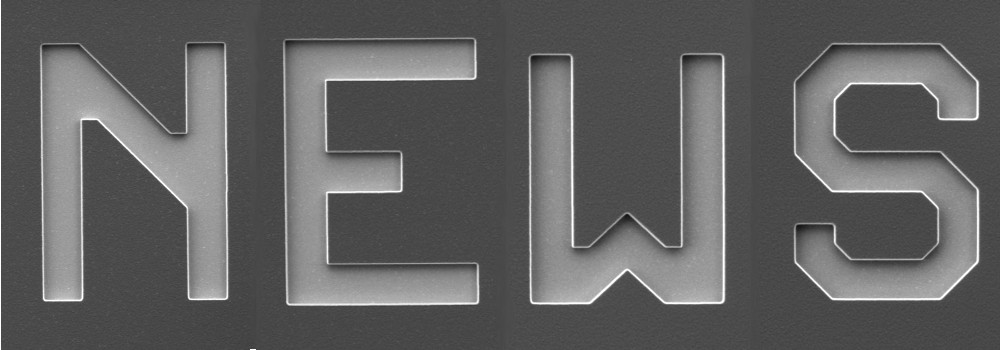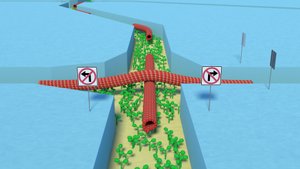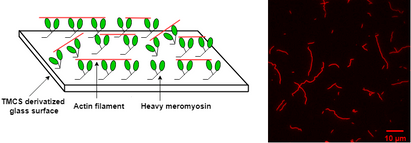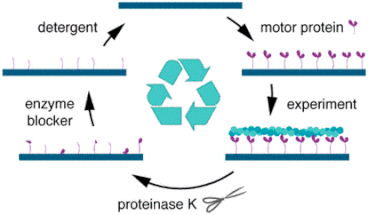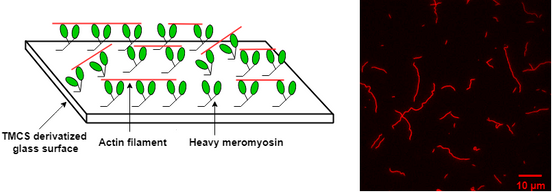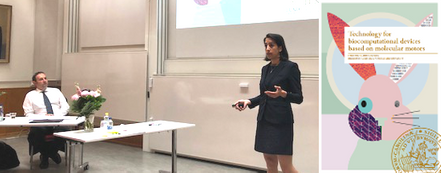July 2022: Bio4Comp in the Swedish Radio Science News
Heiner Linke explains how biomolecules found in cells can pave the way for solving complex logistical problems that electronic computers cannot handle.
Listen to the Science News clip about biocomputers (in Swedish)
Molecular computer uses 10,000 times less energy than a normal one
A chip-sized biocomputer uses molecules moving through a network of channels to solve problems. It uses much less energy per calculation than a traditional computer.
Bio4Comp co-coordinator Till Korten was interviewed which resulted in this article in the New Scientist.
Update December 2021: conference paper now available in the Russian Scientific Electronic Library (e-Library.RU)
Based on the plenary leacture
Molecular Agents Moving in Microfluidic Channel Networks: An Alternative Platform for Information Technology
presented at the opening of the 34th International Scientific Conference on Mathematical Methods in Technics and Technologies (MMTT-34) in conjunction with Cyber-Physical Systems Design and Modelling (Cyber-Phy-2021) held at Ulyanovski Technical University St. Petersburg, Russia, May 31 – June 4th 2021. MMTT-34 and Cyber-Phy-2021 are part of an East-European multiconference event that brings together scientists and experts from various disciplines to discuss latest developments in the field of mathematical and computational methods applied in different contexts of technical and technological systems. Slides will be updated on the Bio4Comp webpages after the conference.
Conference Announcement (in Russian)
Conference Program (in Russian)
Plenary Session with Bio4Comp Lecture (in Russian)
Conference summary (in Russian)
10 June 2020: Towards solving intractable mathematical problems using actin and myosin
Alf Månsson will speak in the virtual seminar series "Motors in Quarantine".
The webinars are organized by the Center for Mechanochemical
Cell Biology and the format is two talks of 15 min and Q&A.
Information and registration for the Motors in Quarantine Talks
14 January 2020: Bio4Comp part of Science Outreach Day by Linnaeus University
The research about actin/myosin in muscle function and the use of its motility for biological computing will be presented to school classes in the Kronoberg County. Venukumar Vemula will be among the 40 researchers that will tour schools to explain what a researcher is and what their research is about for pupils in grade 4-9 in the Kronoberg County. The Science Outreach is a collaboration between the County Administrative Board, Region Kronoberg and Linnaeus University to increase interest in technology, science and mathematics among school pupils. The day has become a success among pupils, teachers and researchers, and will now be arranged for the third time.
ARTWORK: SMART>SOS
SMART>SOS is a video and sound installation revealing the new paradigm of computation based on the research performed in Bio4Comp. Follow the realization of this exciting artwork at imachination projects.
This co-production with the artist Tim Otto Roth was possible thanks to the VERTIGO-project. This initiative facilitates cooperation between artists and research projects within information and computation technologies. The proposal SMART>SOS by Tim Otto Roth has been selected by an international jury of experts for cooperation with Bio4Comp.
The addition of sound and the use of the Bio4Comp technology in an artistic way adds a new dimension to biocomputation which makes the computational processes visually and acoustically tangible. The work with the artist during phase one of the project, inspired the researchers to new insights.The video documents tthe creation phase.
SMART>SOS artwork inspired by Bio4Comp
The artist Tim Otto Roth, imachination projects
TRAINING: APPLY FOR TRAVEL SUPPORT
IDEA COMPETITION: SUBMIT YOUR IDEA
TO VISUALIZE ALGORITHMS
The challenge is to visualize algorithms or to find algorithms that can be efficiently solved by network-based biocomputation. Everyone can participate except employees of the Bio4Comp partner organizations. Deadline is the 15th of February 2020. The prize sum is 5000 Euro (minus income tax if applicable).
Call information: second open-innovation Bio4Comp Award
A new method to regenerate bionanodevices forms an important milestone to saving material and energy and thus, towards sustainable alternative chip technology. The devices do not need to be disassembled, but are treted with proteinase K and washed with mild detergent. Thereafter the surfaces can be functionalized with motility proteins again and used for subsequent gliding assays.
Regeneration of Assembled, Molecular-Motor-Based Bionanodevices
M.A. Rahman, et al. Nano Letters 2019
Biophysical Studies of the Actin-Myosin Motor System and Applications
Congratulations to Mohammad Ashikur Rahman, who graduated on September 05, 2019!
This thesis shows that actin is a dynamic filament upon myosin binding and this information is useful when using actin filaments for Biocomputing.
To control actin filament velocity myosin inhibitors, such as blebbistatin, can be useful for the in vitro motility assays in biocomputation network.
Presence of dead myosin heads negatively affect the actin filament gliding in the in vitro motility assay used in a biocomputation network. This thesis describes and analyses two methods to remove the dead heads to provide good quality assay with nearly 100% fraction of motile filaments recovered.
Biocomputation devices are expensive and time consuming to produce. This thesis describes a method where it is shown that the use of proteinase K with a suitable detergent can be useful to recycle nanodevices for several times.
This thesis studied different ways to immobilize engineered light controlled myosin motor on TMCS derivatized surfaces that shed lights to develop a future programmable gate for a biocomputation network.
On 7th June 2019, Frida Lindberg defended her doctoral thesis in front of an international committee of examiners and opponent Dr. Mihai Irimia-Vladu from Joanneum Research in Austria. "The energy efficient computing of the biological molecules is an important contribution to sustainable chip technology." said Dr. Irimia-Vladu during his overview talk.
Two important techological developments form
the cornerstones of Frida Lindberg's doctoral thesis:
- the surface chemistry of the devices, which is
altered in order to enable re-use and - a more efficient fabrication method by
nano-imprint instead of electron-beam lithography.

